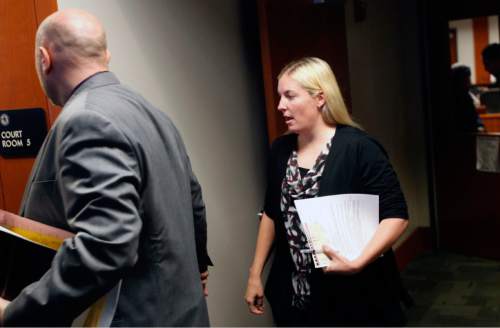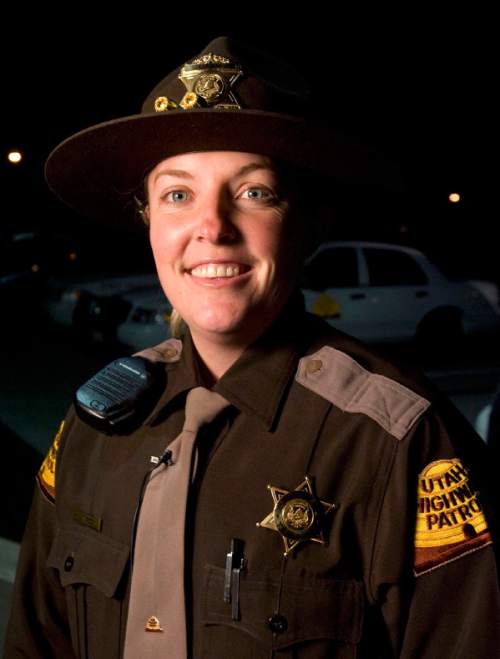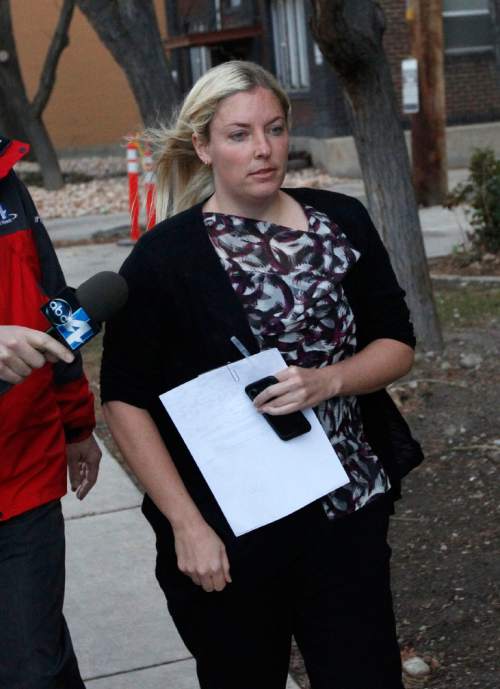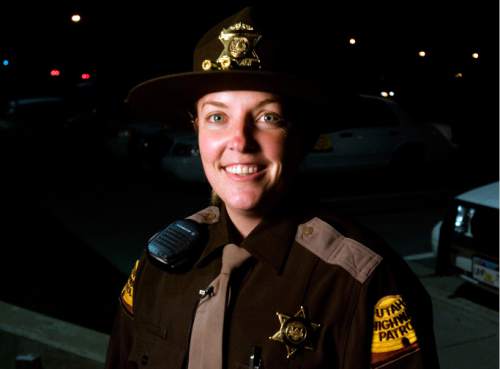This is an archived article that was published on sltrib.com in 2016, and information in the article may be outdated. It is provided only for personal research purposes and may not be reprinted.
A judge has refused to dismiss the lawsuit against a former Utah Highway Patrol trooper accused of illegally stopping motorists, sending the case to trial next month.
It is the first lawsuit to go to trial against Lisa Steed, who was once hailed by UHP for making more than 200 drunk driving arrests a year. Two judges later found to her to be an untruthful witness, and criminal defense attorneys accused her of arresting drivers who weren't intoxicated. UHP terminated her in 2013.
Second District Judge Michael Allphin dismissed the state of Utah from the lawsuit, but kept Steed as the last remaining defendant. He made his ruling from the bench earlier this month and entered it into the court record on Thursday. He will preside over a four-day civil trial scheduled to begin Aug. 16 in Farmington.
The Utah Attorney General's Office, however, must still defend Steed at the trial because the lawsuit covers her time as a state employee. Utah taxpayers could be liable for any awards to the plaintiffs. The plaintiffs have not yet specified how much they will seek.
"The great part is now she has to get up and answer for her actions," said Michael Studebaker, a criminal defense attorney who also is one of the plaintiffs' lawyers in the lawsuit.
Studebaker expects the trial to also explore what Steed's superiors knew about her and when they knew it. One of the exhibits discussed in pre-trial motions has been a 2010 memo by then-Sgt. Rob Nixon warning that Steed was frequently arresting people for driving under the influence of drugs who had no drugs in their systems, and the issue needed to be addressed before defense attorneys learned of it.
"It's going to open up some stuff and shed some light and hopefully air some of the dirty laundry so people know what's going on," Studebaker said Friday.
Dan Burton, a spokesman for the Utah Attorney General's Office, said lawyers there were still reviewing the rulings and had no comment.
The lawsuit has three plaintiffs. The lead is Thomas Romero. Steed pulled him over Sept. 10, 2011, while he was driving to his home in Layton. Steed told Romero she had stopped him because he swerved and then accused him of being intoxicated, which he denied.
Steed asked Romero to perform a field sobriety test. Steed told him he had failed and asked him to take a breathalyzer test and later took a blood sample as he was booked into the Davis County Jail.
Those tests, as well as a blood test he had taken at Davis Hospital after posting bail, all showed no evidence of drugs or alcohol in his system. The case was eventually dismissed, but Romero spent about $6,000 fighting it. He lost his truck, which contained work tools, clothing and other personal items, because he could not afford to pay the fee after it was impounded.
Plaintiffs' attorneys have accused Steed of targeting racial minorities and people in old, used cars.
Allphin will allow the plaintiffs to pursue three civil rights claims: Whether Steed illegally expanded the traffic stops from minor traffic violations to drug cases, whether Steed falsified results of sobriety tests and whether the plaintiffs were arrested without probable cause.
Steed was named Trooper of the Year in 2007. But her credibility was compromised in 2012.
One state judge in Salt Lake County and one in Davis County found Steed had been untruthful on the witness stand during DUI and drug possession cases. The rulings led to a dismissal of charges against both defendants.
In October 2012, The Salt Lake Tribune reported on the Nixon memo. UHP soon terminated Steed. Prosecutors in Salt Lake and Davis counties, where she worked, dismissed charges against more motorists she had arrested. Dozens of other motorists sought to have their convictions overturned. It is unclear how many of them were successful.
Steed appealed her termination. In an administrative hearing in June 2013, Steed admitted to mistakes, including turning off the microphone on her audio recorder to cover up her diversions from UHP's field sobriety tests protocols and to drawing blood on the side of the road from suspects without a supervisor present. Yet she asked for her job back. Her termination was upheld.
Despite the problems found with Steed, attorneys looking to sue her and UHP have had difficulty getting to trial.
Romero's lawsuit was first filed in 2012 in federal court. Attorneys sought to make it class-action. All parties agreed to move the case to state court. But there, Allphin denied efforts to make the lawsuit a class action. The judge ruled that the arrests were not similar enough; that Steed stopped people in too many different places for too many reasons, and that the circumstances of the arrests were dissimilar.
There remains a lawsuit against Steed in federal court in Salt Lake City that makes similar allegations to the suit in state court. A hearing in the federal case is scheduled for Thursday before Judge Clark Waddoups.
Twitter: @natecarlisle









